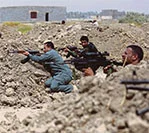OVER the past few weeks, the chorus of disapproval against the radical Islamic State (IS) movement in Syria and Iraq has grown, with important leaders from all across the Muslim world chipping in: Indonesia’s Minister for Religious Affairs Lukman Saifuddin was one of the first to denounce the movement as being un-Islamic, which was a theme later taken up by President Susilo Bambang Yudhoyono himself, and then by the influential Majlis Ulama Indonesia that likewise condemned IS’s wanton acts of brutal violence as beyond the pale of Islam.
In the Arab world, prominent scholars, including the mufti of Saudi Arabia, have voiced their concern about the growth of the movement and the negative effects it has had, radicalising Muslims and besmirching the image of Islam.
These condemnations are righteous and to the point, and they ought to be repeated time and again in order to underscore the strong disapproval among the majority in the Muslim community who reject the ways of IS and see it as an outrage against the norms of Muslim religiosity.
But the condemnation cannot simply stop there, without addressing the equally pressing need for objective analysis. For the problem with IS is that it is a movement that can easily be replaced by another; as it itself was a manifestation of the earlier al-Qaeda movement whose notoriety has waned somewhat.
The saddest thing about radical extremism is that it abhors a vacuum and that once a group falls by the wayside by becoming discredited or irrelevant, another — often more radical and violent group — will emerge to assume the mantle of leadership. This is exactly what IS has done to al-Qaeda, by upping the stakes in the radicalisation contest and by performing deeds even more destructive and violent than its predecessor.
Such groups thrive in situations of radical contingency and chaos, where states fail and social cohesion is absent. Is it a wonder that IS grew out of the political mess that is Syria-Iraq today, and that it counts in its ranks thousands of angry, disillusioned and disaffected men whose lives may be worth nothing to themselves?
The failure of the Nouri al-Maliki government in Iraq to create the conditions where a plural representative democracy could have emerged was one of the factors that contributed to the massive pool of supporters that IS now enjoys there.
And it was the failure of the planned peaceful transition to a working democracy in that country which has now left other communities: Sunnis, Kurds and other ethnic-religious groups feeling that the path of violence is the only one left to follow.
The Muslim world today is in a state of crisis, with political upheavals across the Arab world, North Africa, South Asia and parts of Southeast Asia, too. It is in these societies that an entire generation of young men — angry, tired, cynical and void of hope — feel that they have nothing left to lose by giving their lives to one last brutal fight to the finish.
The same can be said for the hundreds of Muslim migrants from Europe and other developed countries who have likewise come to regard themselves as pariahs in their adopted countries: unloved, unwanted and with no hope for the future.
There is frankly no point telling angry, unemployed and unemployable people to be calm and patient with their lot, when they can see all around them other actors in society moving up the social ladder while they stagnate and rot.
In this global age where our communications infrastructure provides us with constant stories of economic success and social capital being gained by others, to fall by the wayside and find oneself in a country with no future is harrowing indeed.
So while it is vital for Muslim leaders — notably religious scholars and statesmen — to stand up to IS and to denounce their excesses as un-Islamic, it is also vital to address the very real socio-economic inequalities that exist in many parts of the developing world, and among minority groups that have not been able to fully integrate into their host societies and economies.
Religious extremism has a political-economy of its own, and like more mundane but equally dangerous instances of urban crime and lawlessness, it is the net result of uneven power and economic differentials that create that vast pool of angry men in the first place.
It is fine and well to talk about the battle for hearts and minds in the reformation of modern society, but hearts and minds are tied to wallets, jobs and other very real variables as well. To heed the former while neglecting the latter would be a case of misdiagnosing the problem and, perhaps, making things worse.
Article by Dr Farish Noor which appeared in New Straits Times, 25 August 2014.





